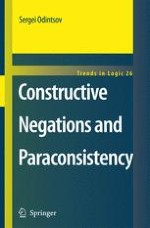
2008 | OriginalPaper | Chapter
Introduction
Published in: Constructive Negations and Paraconsistency
Publisher: Springer Netherlands
Activate our intelligent search to find suitable subject content or patents.
Select sections of text to find matching patents with Artificial Intelligence. powered by
Select sections of text to find additional relevant content using AI-assisted search. powered by
The title of this book mentions the concepts of paraconsistency and constructive logic. However, the presented material belongs to the field of paraconsistency, not to constructive logic. At the level of metatheory, the classical methods are used. We will consider two concepts of negation: the negation as reduction to absurdity and the strong negation. Both concepts were developed in the setting of constrictive logic, which explains our choice of the title of the book. The paraconsistent logics are those, which admit inconsistent but non-trivial theories, i.e., the logics which allow one to make inferences in a non-trivial fashion from an inconsistent set of hypotheses. Logics in which all inconsistent theories are trivial are called explosive. The indicated property of paraconsistent logics yields the possibility to apply them in different situations, where we encounter phenomena relevant (to some extent) to the logical notion of inconsistency. Examples of these situations are (see [86]): information in a computer data base; various scientific theories; constitutions and other legal documents; descriptions of fictional (and other non-existent) objects; descriptions of counterfactual situations; etc. The mentioned survey by G. Priest [86] may also be recommended for a first acquaintance with paraconsistent logic. The study of the paraconsistency phenomenon may be based on different philosophical presuppositions (see, e.g., [87]). At this point, we emphasize only one fundamental aspect of investigations in the field of paraconsistency. It was noted by D. Nelson in [65, p. 209]: “In both the intuitionistic and the classical logic all contradictions are equivalent. This makes it impossible to consider such entities at all in mathematics. It is not clear to me that such a radical position regarding contradiction is necessary.” Rejecting the principle “a contradiction implies everything”(ex contradictione quodlibet) the paraconsistent logic allows one to study the phenomenon of contradiction itself. Namely this formal logical aspect of paraconsistency will be at the centre of attention in this book.